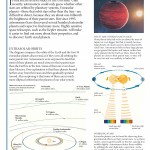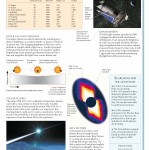Is our Solar system unique in the Universe ? Until recently, astronomers could only guess whether other stars are orbited by planetary systems. Extrasolar planets – those that orbit stars other than the Sun – are difficult to detect, because they are about one – billionth the brightness of their parent stars.
Extrasolar planets can also be detected by watching for a drop in brightness as a planet transits, or passes in front of, its parent star. The changing brightness of the star can be plotted on a graph called a light curve.
Another proposal, called gravitational microlensing, is to watch for sudden brightening as the planet’s gravitational field acts like a lens and magnifies the light from a more distant star.
Related posts:
The Constellation space transportation system will be able to carry out multiple tasks, space station resupply and moon missions, among others – using some shared and minimally modified elements, TO reduce risks and save costs, many of the components were based on existing technologies.
Inferior planet may be the next earth in the Sunshine, orbiting this every single 224.7 World days. The earth is known as following your Roman goddess of love and elegance. Following the Moon, it's the cleverest natural object at night heavens, achieving an evident degree of −4.6, vivid sufficient so that you can cast shadows. Simply due to the fact Venus is an terrestrial planet through Plane...
The dominant features on the Moon’s nearside – the side that always faces the Earth – are the dark maria, which early astronomers thought were seas. These lava – filled basis formed when molten rock seeped through the Moon’s crust to fill depressions left by meteorite impacts.
The Lunar Module Ascent Stage Interior View contains many core parts that include the cabin Relief Dump valve, overhead hatch, drogue. The core module in the middle contains oxygen control module, Ecs LiOH cartridge storage, Water Control module, ECS LIOH Cartridge, Cabin Recirculation Assembly. The lower part of the module contains some light weight protocols like Coupling Data Unit, Portable Lif...
The Lunar Module Ascent stage also acts as a core component of this vehicle. It contains the Internal Measurement unit, the water tank, AFT Equipment Bay, Electronic Equipment, the Gaseous Oxygen Tank, Helium Tank, RCS Fuel Tank, APS Fuel Tank, RCS Helium Tank, RCS Oxidizer Tank, Ingress or the Egress Hatch and the RCS Quad.
The Sun is our nearest star. It is a huge, luminous ball of gas like all the other stars. It consists mostly of hydrogen, and helium with tiny amounts of other elements. The Corona is the outer shell of the Sun’s atmosphere. It is extremely hot with temperatures reaching up to 2 million degrees. In the radiation zone, the energy is transported outwards by radiation. It covers about 70% of the Sun’...
The physical investigation of the Moon started when Luna 2, a space test started by the Soviet Union, made an effect on the surface of the Moon on September 14, 1959. Former to that the sole good to go method of investigation had been perception from Earth. The stroke of genius of the optical telescope realized the first jump in the value of lunar recognitions. Galileo Galilei is ordinarily...
After Pluto was discovered in 1930, it was regarded as the ninth major planet, although it was soon found to be very different from the others. It is smaller than Earth’s Moon and follows an elongated, titled orbit. In the 1990’s astronomers began to discover small bodies similar to Pluto beyond Neptune. Some, such as Eris, were larger then Pluto. In 2006, astronomers decided to define a ne...
What qualifies as low entropy or high entropy depends on the situation. Physicists identify the high – entropy state of a system based on how the system evolves over time. For example, if a diffuse and sufficiently cool gas feels the tug of gravity, it evolves to a clump. The law of entropy increase then implies that the clump has high entropy, even though at first glance it might appear to be...
The classification of time into discrete named pieces is called periodization. This is a record of such named time periods as described in different fields of study. Major ordered frameworks incorporate cosmological (concerning the diverse time periods in the beginning and development of our universe), topographical (concerning time periods in the starting point and advancement of earth ) and acad...
All of the stars in “The size of our world” and all the stars you can see in the sky are only in our own galaxy ! What lies beyond our galaxy? It is a great miracle to know about these facts. The Hubble space telescope kept its camera pointed there for over 4 months, taking in all the light it could. The area, about a tenth the size of the full moon, appeared to be complete blackness with no st...
Space messages tell about the biosphere, that includes the basic chemical compositions of the continents, oceans and atmosphere. The highest and lowest points of Earth and the surface strength of gravity are also listed in the space messages. Along with the relative sizes and ordering of the planets in our solar system, this message tells about the mass and radius of both our Sun and Jupiter. ...
So incomprehensible is space that unequivocally to discover our earth's planetary group we should make five jumps of scale. The critical unifier of the universe is gravity. It keeps the stars of a system and the systems of a group, as a single unit. Anyhow bunches, gatherings and segregated unique systems are all taking off from one another, a carrying on repercussions of the huge explosion, an er...
Sirius is the brightest star in the night sky. With a picture based clear degree of −1.46, it is for all intents and purpose twice as bright as Canopus, the subsequently brightest star. The name "Sirius" is dead set from the Ancient Greek ("sparkling" or "scorcher"). The star has the Bayer designation Alpha Canis Majoris. What the uncovered eye perceives as a particular star is blatantly a paralle...
The Apollo Command Service Module The Command/Service Module (CSM) was one of two spacecraft, along with the Lunar Module, used for the United States Apollo program which landed astronauts on the Moon. It was built for NASA by North American Aviation. The Apollo Lunar Module (LM), also known as the Lunar Excursion Module (LEM), was the lander portion of the Apollo spacecraft built for the US ...
What was the time outside the circle of light is now space, so a man can easily walk donw into our past. If he walks out of the loop, he may see himself waiting to go in. Inside the light beam, time is warped into a loop.
Venus is called a mediocre planet being as how it circles closer to the Sun than the Earth does, Venus is a circle of rock comparable in size to the Earth – But there the examination finishes. Venus is a dull, dangerous universe of volcanoes and suffocating environment. Its normal temperature is higher than that of whatever available planet. From Earth, we can see just the planet's clout tops.&nbs...
The Sonoma State University NASA Education and Public Outreach group, in collaboration with several other people, has created a series of formal and informal education and outreach products based on the science of black holes. The formal products – which include an educator’s guide with activities and in online resource are closely tied to the informal products, which include a planetarium show, a...



 Upload your infographic here and contribute to our community.
Upload your infographic here and contribute to our community. 
Leave a Reply